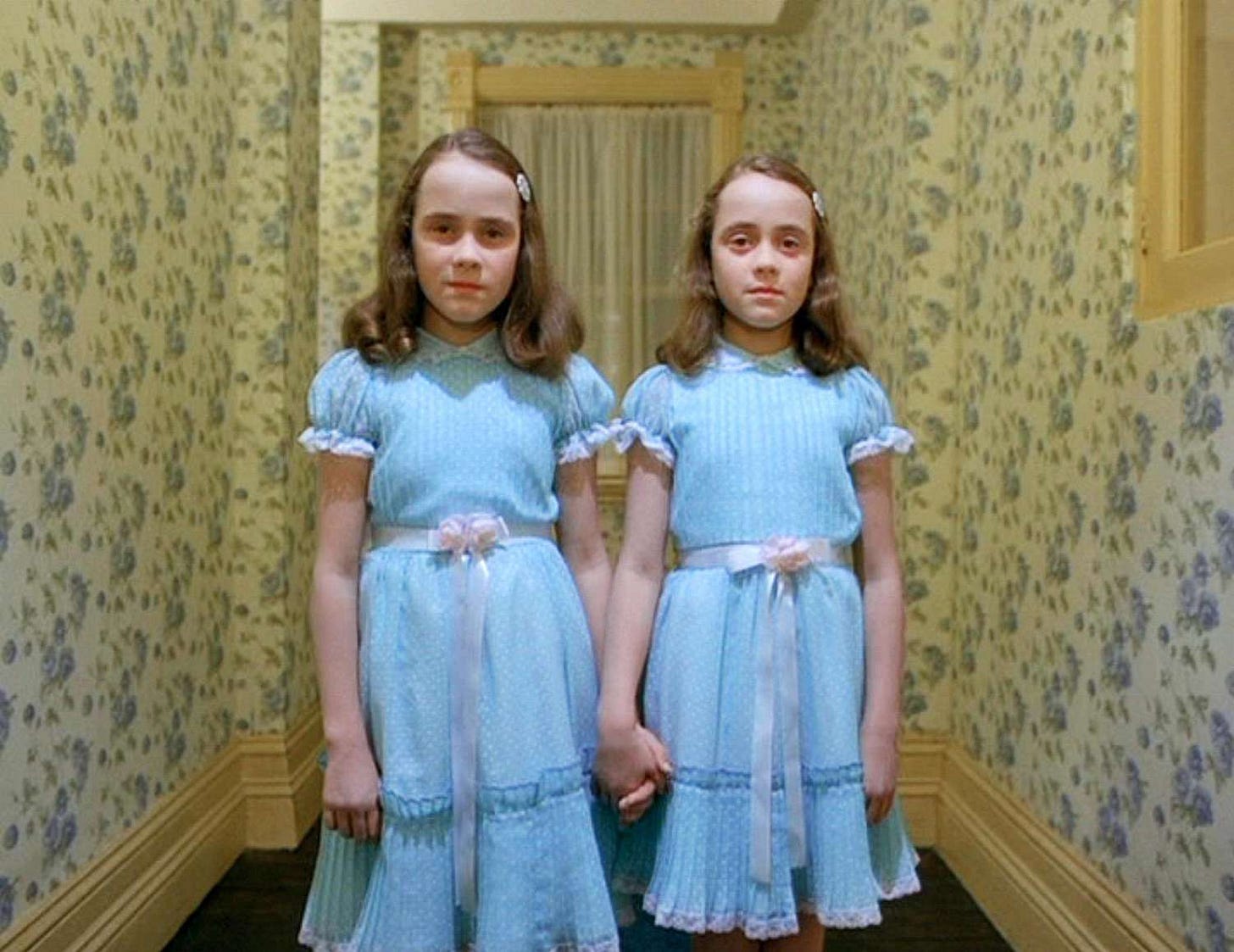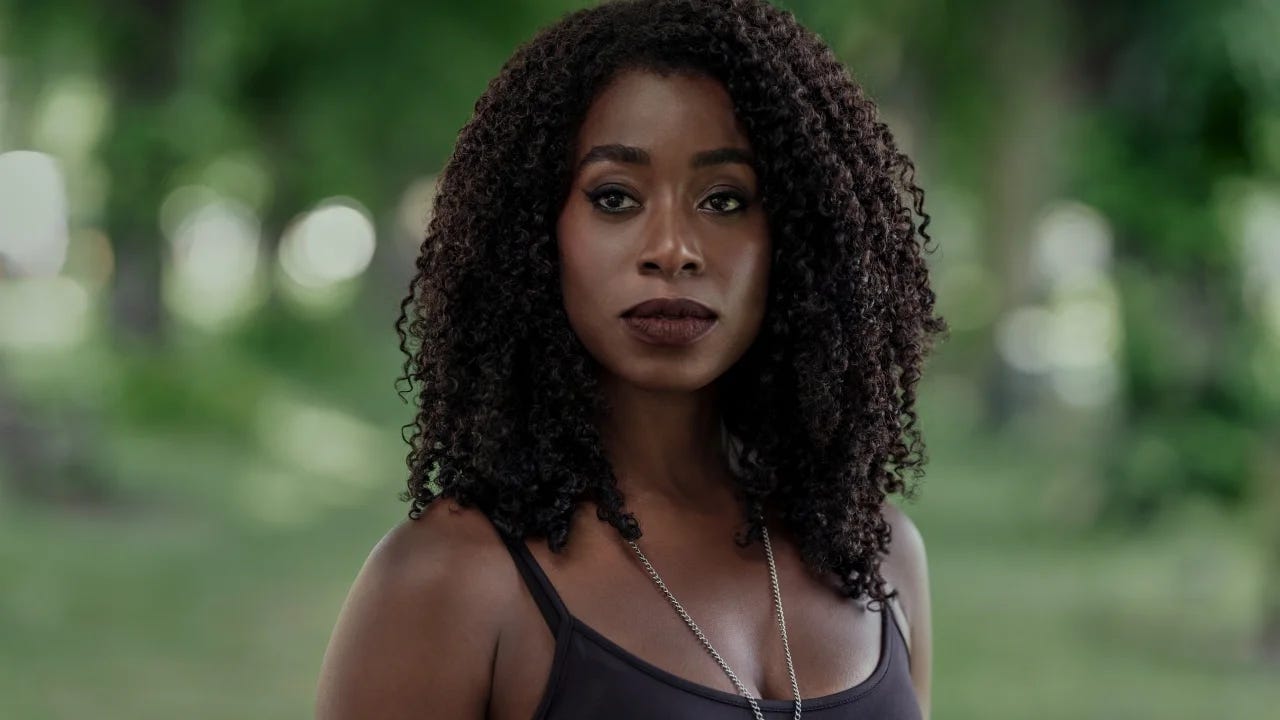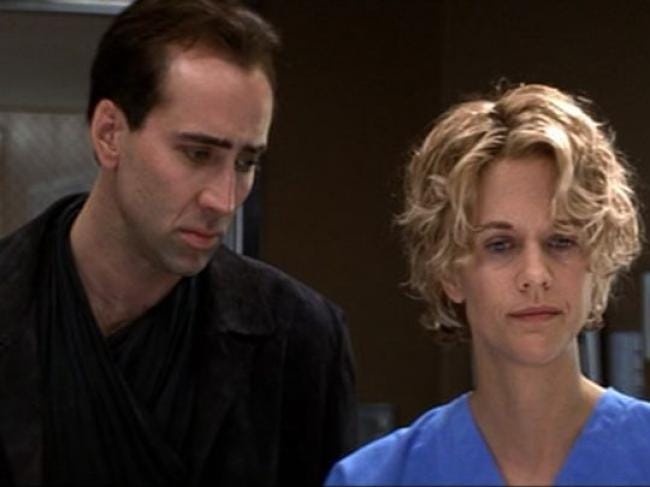As a teen, I wept over the Meg Ryan/Nicolas Cage tearjerker City of Angels, director Brad Silberling’s take on Wim Wenders’ Der Himmel über Berlin (a.k.a. Wings of Desire). Mock me if thou shalt, but 17-year-old Sara loved the story of an angel, Seth (Cage), who makes himself visible in order to win the love of the world’s most adorable surgeon, Maggie (Ryan).
The screenplay by Dana Stevens (with credit for the underlying source material going to Wenders, Peter Handke and Richard Reitinger) is not regarded as one of our modern classics. But I loved this damn movie, and it taught me something important about writing.
I’ll get to that, but first I am duty-bound to provide some illuminating cultural context for those who were not of PG-13 age (or alive) in that wacky moment at the end of the previous century.
Fact one: “Maggie” was the “Chloe” of lady protagonist names in that era.
Fact two: This film’s soundtrack had two mega-hit singles: the Goo Goo Dolls masterpiece known as “Iris” and Alanis Morissette’s genuinely scary, based-on-a-true-story “Uninvited.”
Fact three: Of all the films released in 1998, this one taught us the most important angel science. For example, heavenly angels are invisible to alive humans unless said angels choose to make themselves visible to us. Also (and we learn this from Dennis Franz) they can “fall” and become human in order to consensually do sex with us!
Under the stewardship of producer Dawn Steel and husband/co-producer Charles Roven, director Silberling and writer Dana Stevens collaborated on the sorta-kinda-reboot of the Wenders original.
One of the first women to run a major movie studio, Steel was a legend in her own time. Her 1993 memoir, They Can Kill You — But They Can’t Eat You, is supposed to be dishy. Apparently, she portrayed herself as a tough cookie who contended with a family legacy of mental illness and such harsh blows as being fired while in the hospital, right after giving birth to her daughter.
I read a 1993 review that, while mostly positive, criticized Steel’s use of such “psychological buzzwords” as low self-esteem. The reviewer found the famously self-confident Steel’s acknowledgement of her own inner sensitivity to be a tad unbelievable, as if softness and strength could not coexist in one woman.
It was the ‘90s, sure. But even today, a belief persists that men may encompass worlds, but women may at best encompass one cute midsize town. (If they’re considered intellectual gals, maybe it’s a college town.) I am not sure where trans and nonbinary folks fall in this belief. I think they are simply not included at all.
In a career that should’ve been longer, Steel oversaw the development of such films as Flashdance, Fatal Attraction, Footloose, The Untouchables, The Accused, and Awakenings. December 1997, Steel died of brain cancer, leaving behind her daughter and husband. The couple had coproduced City of Angels. It was released in April 1998, and was dedicated to her.
The film was a hit, with the $198.7 million worldwide box office more than recouping the $55 million budget. It received mixed reviews by people who presumably did not understand the all-encompassing power of human/celestial love.
I, on the other hand, was wiser. I was 17, and 17-year-olds are always wise, even if they have to hide it to survive.
My mom remarked recently that I probably escaped from family life into books as a kid. She was right. But I had also learned many things about life from a childhood spent marinating in the audiovisual world of Shelley Duvall’s Faerie Tale Theatre and Roberta and Ken Williams’ King’s Quest games.
Also, my parents made me Catholic. I was primed to believe in things like, say, Nicolas Cage being an angel who chooses to fall to earth in order to have sex with Meg Ryan. Whomst among us, etc.
I can’t remember most of the movie, although there’s a sad scene with Meg Ryan and an apple, which is different from the not-sad scene with Meg Ryan and an apple in Sleepless in Seattle. I vaguely recall Andre Braugher being perfect as usual as Cassiel, an angelic colleague of Nicolas Cage.
But one moment in particular remains in my brain along with plenty of other pop culture detritus from throughout my life. The most recent addition: a near-constant replay of the chorus to Taylor Alison Swift’s “Forever and Always (Taylor’s Version).”
In the City of Angels scene that has never left me, Doctor Megan Ryan is performing heart surgery on a guy who is fated to die. Invisible Angel Nicolas Cage has been selected to bring this fellow to Heaven.
Side note: Would I rather by taken to heaven by Nic Cage in Goth angel drag or by Sandman’s Kirby Howell-Baptiste? The answer has a British accent, Your Honor!
So IANC shows up for the big moment, and BAM! He falls immediately in love with Dr. Meg Ryan, because she is Meg Ryan.
Creepily, IANC can listen in on her thoughts. (Invasive! But not his fault! He’s an angel and he has a job!) When he peers into the cutest doctor brain in the whole wide world, what does Invisible Angel Nicholas Cage hear?
This is America, so it’s a commercial jingle, of course. Here’s the absolute banger Dr. Meg Ryan has stuck in her head: I am stuck on Band-Aid brand ‘cause Band-Aid’s stuck on me.
As a dewy baby born in 1980, I was unfamiliar with this old commercial (trigger warning for medium-bad sound quality, late’ ‘70s normcore fashion and adult thespians with no Botox.) But I’d heard the jingle on the radio.
In the midst of completely buying into the story unfolding onscreen, I heard that voiceover of Ryan adorably singing that Band-Aid song and thought, “Hey - that’s so smart.” It took me out of the movie, but not in a bad way.
It was intended as a moment of levity, and the humor landed well with the packed theater in which I sat. The thought suddenly occurred to me that somebody had decided she should be singing that jingle in her head. It didn’t just happen.
It’s only the second time in my youth I can recall noticing that an invisible somebody was pulling the audience’s emotional puppet strings through a scripted onscreen moment. The invisible somebody was not Nic Cage, or an angel, but an entity I found even harder to believe was real: a screenwriter.
The first time I had sensed the creator behind the onscreen creation was when I watched Stanley Kubrick’s adaptation of Stephen King’s The Shining. I was probably nine or ten years old. I think I was at a sleepover with a friend and some older girls.

It scared the shit out of me, but was so artfully crafted and visually splendid that part of me couldn’t help but stand outside the fear and think, “Somebody made choices about how this should look. And then other people helped carry out those choices. It didn’t just…happen.”
The Shining became, and remains, perhaps my favorite film.
Back to 1998, City of Angels, that song and that scene. It was so silly, and so sweet, and the gentle laughter in the audience came from our collective pleasant surprise. It was a moment of release in a film that would ultimately make many of us cry.
The next year, I took a film criticism class. Of course we watched some Kubrick - in this case, Dr. Strangelove on VHS on a TV the teacher checked out and rolled in on a tall stand. I can also remember It Happened One Night, the 1934 Frank Capra-directed classic starring Clark Gable and Claudette Colbert. Robert Riskin wrote the screenplay based on a short story, “Night Bus,” by Samuel Hopkins Adams.
I had taken to books early, and done plenty of literary analysis in my English courses. But that New Jersey public high school elective class was the first time any adult had encouraged me to recognize a movie as something that was planned out in advance rather than something that landed, fully formed, just to entertain viewers. That class didn’t make me into a film geek, but it made me watch film and TV more closely, wondering who made what choices, and why.
I have never wanted to be a director, especially since I found out how much work they do. The film director, a once-mysterious archetype whose actual existence I first began to contemplate as a fourth grader watching The Shining, has to be many things at once: magician, logician, philosopher, salesperson, motivational speaker, air traffic control manager; group therapist; team coach; individual coach; CEO; attorney for the defense; attorney for the plaintiff; judge; jury; and occasional sweet-talking liaison with ornery locals, law enforcement, and (especially on a low-budget film) Guy Upstairs Who Won’t Stop Blasting EDM While Crew Are Filming In Somebody’s Cousin’s Borrowed Apartment.
TV directors require the same skills, as well as the ability to swallow their egos when they are aggressively micromanaged and treated as disposable hired hands. It’s not always the case, and it can happen on film sets, too. However, it’s rare - to say the least - that a TV director is regarded as a visionary.
So anyway, I never wanted to be a director, though my admiration for them is immense. But I always wanted to be a writer - of essays, magazine articles, books, and, eventually, film and TV.
If you’d told me in 1998 that I would become a member of the Writers Guild of America, I would’ve first asked what the hell that was. Then I would’ve asked how the hell that happened.
I would tell my younger self, “At some point in your thirties, you went from wondering Who made this happen? to wondering if you could help make something like that happen, too.”
I imagine my younger self would wrinkle her nose and said, “Not ‘til my thirties?”
“Chill out,” I’d tell her. “You’re in your forties now. Or you’re 17. Or - I gotta go. Be careful with birth control! Don’t worry about your break-ups, you’ll get through them all! Take time off in between relationships to be single! Start a 12-step program in your twenties! Only ever have one credit card and pay off the balance every single month! Do queer stuff in college instead of waiting ‘til your late twenties!” Then I would fade away, like a lower-tier spirit from the Beyond, or someone with an essay deadline.
City of Angels isn’t up there with The Shining for me. But those few lighthearted seconds in the midst of encroaching death, making us laugh as we know the patient on the table is destined to die, and that - even worse - Meg Ryan is destined to be sad about it? It reminded me of something familiar I knew from home, something I relied on to break up the darkness.
The comfort of silliness as the darkness closes in. The potentially life-saving properties inherent in a goofy pop cultural reference. The joy in the banal.
As a teen, I marveled at it. Of all the things that could’ve been happening in that character’s internal monologue in that pivotal scene, it was that frigging Band-Aid jingle. Who in the world would come up with an idea like that?
The answer, I soon realized, was a writer. And that stuck with me.
***
Thank you so much for reading. If you’d like to support my work, please consider becoming a paid subscriber on Substack. To learn more, check out my About page here on Substack, my website, Instagram and/or Patreon.





I just started a Substack yesterday called Still Singing. I’m excited to see where it goes! There is ALWAYS a song in my head, and that Band-Aid jingle, I think, was written by Barry Manilow, if I’m not mistaken. I will always be a Fanilow.
Now I have both of those songs stuck in my head, and I thank you for it 💕